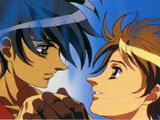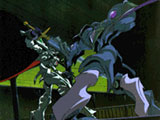

Quick Links:
The Vision of Escaflowne, TV Series
The Vision of Escaflowne is a classic masterpiece of anime. Following the story of Hitomi, an ordinary high school girl, as she is transported to the mystic world of Gaea after saving the life of a mysterious swordsman, the Vision of Escaflowne does indeed explore a wondrous vision of its own - a world with two moons in the sky (one of which is our own Earth) replete with fantastical races, an interesting mix of technology and magic, and an unforgettable cast of characters.
Plot-wise, Escaflowne unfolds its mysteries and conflicts brilliantly. Much of the story encompasses an odyssey of sorts through this fresh, new world, punctuated by an overarching struggle against the Zaibach Empire and many revelations, both about characters' backgrounds and about the underpinnings and mysteries of this Gaea. Also, while there are many elements familiar from other Sunrise films, such as the themes of war versus peace and the warlike nature of man, or "mobile suits" (guymelefs in this anime), Escaflowne manages to incorporate them with enough subtlety and freshness as to become much more than a simple rehash. Some of the theoretical underpinnings of the show, involving the gravity of destiny, might seem a bit hokey, but it all works out quite beautifully in the somewhat surprising ending... and certain scenes and references also reveal the creators' sense of humor about the whole theory ^_^ All in all, the plot line is perfectly matched to the pace and length of the show - nothing is too hurried, and there aren't any silly filler episodes that so often "grace" TV series.
The characters are really the heart of Escaflowne, in spite of the dynamic plot. I spoke of Escaflowne as an odyssey before, in a literal sense, but it also works in a metaphorical sense when applied to the character development - over the course of the series, every major character manages to learn something substantial about life, and change positively from the experience... even Dilandau. The characters all have fairly complex backgrounds which are touched on here and there, giving the audience an excellent framework for identifying with the characters' reactions and appreciating their various changes. Romantic inclinations of the various characters are also constantly shifting, driving a lot of the conflict in the show and keeping the audience guessing about what is to come, and rightly so in many cases - but don't mistake this to mean that Escaflowne is a simple romantic comedy. Understanding one's feelings and relationships with people as well as with the world are an important part of the process of maturation which occurs to the characters, especially the protagonist, Hitomi.
Escaflowne's animation is the best animation I've seen for a TV series to date, though admittedly, I haven't seen many of the more recent series like Cowboy Bebop. At the very least, it is the best TV animation for its time period. Nearly every frame is teaming with detail; there isn't any blatant recycled footage; and the action scenes are quite artfully done, doing an excellent job of capturing the motion of the fights. It's still not consistently the most fluid animation around, with many stylistic tricks used from time to time, but I never felt short-changed by their usage, since it always seemed to fit the scenes perfectly. The CG effects are integrated beautifully with the rest of the animation, adding some nice touches from time to time. Additionally, the concept artwork is all quite striking, doing a great job of giving Escaflowne its unique look.
Escaflowne also has a spectacular soundtrack. The opening and closing songs are quite catchy; and the background music is an inspired selection of classical music, often accompanied by Latin vocals. Suffice to say that the background music does a masterful job of evoking the emotion associated with each scene, from the motion of the Escaflowne charging into combat to poignant scenes of sorrow. The music really speaks for itself - I know several people who aren't particularly interested in anime but were captivated by hearing the soundtrack.
In all, Escaflowne is a work of pure genius which can be appreciated by anyone. Great animation and a great soundtrack frame a storyline that involves both dramatic character interaction and some intriguing background themes. Sunrise really outdid themselves in making this series.
On a localization note, there are a few translation notes which might be of interest. First of all, Bandai has translated "sempai" as "Captain" when used in the context of Amano-sempai. A more accurate translation would be "Upperclassman," since it is a title of respect appended to the names of people in higher grade levels in school. You'll also probably note that they have liberally equated "sempai" with "Amano" at times, slightly changing the interpretation of the dialogue, such as when Hitomi first meets Allen Schezar, and mistaking him for Amano, begins murmuring sempai several times before uttering "Amano-sempai."
Secondly, the translator had a proclivity for translating "Fanelia-Ou" as simply "Fanelia," instead of "King of Fanelia," which always bugged me, even though it is one possible royal convention in English. Thirdly, Allen Schezar's position is given as "Knight Caeli," which might obscure the meaning of the title for someone not familiar with Latin. Caeli means of the sky, or of the heavens - the original Japanese did not include the Latin, instead using "tenkuu." I think I also remember them leaving off the teikoku suffix, which was appended to Zaibach at times - Zaibach-teikoku would mean the Zaibach Empire, making clear that Zaibach was not simply a kingdom, as were Asturia (which sounds like Astoria to me) and Fanelia. For some reason, I was also bothered that they chose to call the stealth "mantles" "cloaks," even though the Japanese was clearly the katakana for "mantle." I'd imagine Bandai just felt like drawing on the jargon connection to "cloaking devices" in choosing to call these mantles "stealth cloaks." Finally, as an errata, for some reason the Escaflowne is initially called an "Yspano" guymelef, and then later consistently called an "Ispano" guymelef.
Obviously, all of these complaints are exceedingly nit-picky, and as a whole the conversation seemed to be translated quite well, with nothing blatantly left out. None of the above comments should really effect the experience of Escaflowne for any but the true purists ^_^
Distributor: Bandai Creator: Shoji Kawamori, Sunrise Released: 1996
Plot: A+ Character Design: A+ Animation Quality: A- Music: A+ Overall: A+



